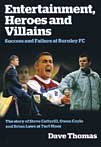 Success and Failure at Burnley FC
Success and Failure at Burnley FC
by Dave Thomas
Vertical Editions, £12.99
Reviewed by Alan Tomlinson
From WSC 294 August 2011
When Burnley drew Bolton Wanderers in the Carling Cup the season after their Premier League campaign, all was in place for a morality play as much as a football match. Owen Coyle, the Bolton manager, had walked out on Burnley in the middle of their first year back in English football's top tier for 33 years. Burnley tumbled down the league table, Bolton survived and Coyle was labelled Judas by inconsolable Burnley fans.
Burnley's victory in this Carling Cup game was welcomed as a form of mass collective therapy by one of the architects of the club's rise to the Premier League, director Brendan Flood. Coyle commented after the defeat that football is "about entertainment and heroes and villains". Burnley fan and football writer Dave Thomas makes this observation the basis of his book title, which he also describes as "the story of Steve Cotterill, Owen Coyle and Brian Laws at Turf Moor".
The impact and success of Coyle is the core of the book, which follows a fairly conventional format of rags-to-riches for a lad from Glasgow, one of nine children, the six boys sharing a couple of double beds in a three-bedroom maisonette in the Gorbals. Coyle was revered in his time at Burnley for inspirational management that made ordinary players aim higher. Andy Cole commented that Coyle could make players ten times better. Clarke Carlisle recalled that the Scot "made you believe you could be the best". Thomas's study includes testimony after testimony to Coyle's man-management skills, professionalism and enthusiasm.
The book begins with the later phase of Steve Cotterill's time as manager and contrasts the sterility and staleness of that period with the remarkable story of Coyle's success in dramatic cup runs and then promotion to the Premier League, via the play-offs and a Wembley final in May 2009. Burnley fans will relish the memories stirred by Thomas's mix of personal diary entries, press cuttings and some new and welcome interview material. The extraordinary team spirit and collective motivation fostered by Coyle bonded a small and modestly paid group of players, producing a "Band of Brothers" never-say-die attitude that led to one of the most romantic stories of football renaissance of recent years.
The bulk of Coyle's squad was inherited from his predecessor. His infectiousness and positive leadership – replicated when he moved on to Bolton – are richly detailed in the book. Thomas's collation of reports and commentaries, particularly players' retrospective accounts, confirms that when Coyle left, stripping Burnley of all key backroom staff, the club and the team were left rudderless. Somewhere within this book is an intense study of the psychology of leadership. Anyone who saw Carlisle's inept performance at Turf Moor against Portsmouth, a few weeks after the departure of Coyle and the arrival of the doomed Brian Laws, was witness to an act of professional disintegration. Carlisle was unrecognisable as the player who had led the team to its promotion run at the end of the previous season.
This is a compelling read, then, for the Burnley fan. But to engage fans more widely, Thomas would have been advised to shorten long extracts, check for repetition and sharpen his own interpretations. There are also numerous typos ("old Trafford", p235 and "Crewe Alexander", p23) not befitting a former headmaster now working on his tenth book. A little more editing and checking would have made this a smoother and more focused read, of interest to the general fan and not just the Burnley diehard.